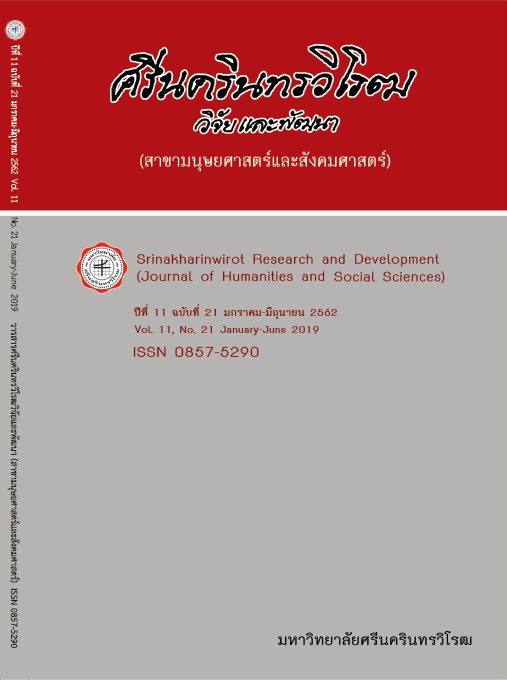ปัจจัยที่ส่งผลต่อการใช้ประโยชน์จากงานวิจัยโดยหน่วยงานภาครัฐของไทย FACTORS INFLUENCING RESEARCH UTILIZATION BY THAI GOVERNMENTAL AGENCIES
Keywords:
Research Utilization, Policy Research, Governmental AgencyAbstract
This article reports the results from a study of factors influencing the utilization of research knowledge by Thai governmental agencies. The researcher had drafted the questionnaire based on the relevant literature reviewed. The draft questionnaires were tested with 30 sample government officials. Revised questionnaires were then sent by the postal mail to 3,529 sample governmental agencies with a cover letter requesting the senior management official or a person assigned by senior management official to fill in the questionnaire. The sample governmental agencies were derived from the stratified sampling process with governmental agencies divided into five groups including centralized governmental agencies, provincial governmental agencies, local governments, state-owned enterprises, and public organizations. The results from the OLS regression shows that factors that explain the increase in research utilization by governmental agencies include: (1) the interaction between governmental agencies and research community; (2) the effort made by researchers/research organizations to disseminate research results for policy utilization; and (3) the need of research knowledge by governmental agencies. It is also found that types of research, reputation of researchers/research organizations, and governmental agencies’ capacity to absorb research knowledge are less significant for research utilization. This article highlights, as a policy implication, the importance of establishing linkage mechanisms that can facilitate the interactions between the research organizations (e.g. universities, public and private research agencies, etc.) and governmental agencies and that can be served as a conduit to bring research into policies and practices at the national, regional, and local levels.
Downloads
References
[2] Cherney, A.; & McGee, T. R. (2010). Utilization of social science research: Results of a pilot study among Australian sociologists and criminologists. Journal of Sociology. 47(2): 144-162.
[3] Cherney, A., Head, B., Breham, P., Povey, J.; & Ferguson, M. (2013). Research utilization in the social sciences: A comparison of five academic disciplines in Australia. Science Communication. 35(6): 780-809.
[4] Ouimet, M., Landry, R., Amara, N.; & Belkhodja, O. (2006). What factors induce health care decision-makers to use clinical guidelines? Evidence from provincial health ministries, regional health authorities and hospitals in Canada. Social Science & Medicine. 62: 964-976.
[5] Smits, P. A.; & Denis, J.-L. (2014). How research funding agencies support science integration into policy and practice: An international overview. Implementation Science. IS, 9: 28. Retrieved December 13, 2015, from http://doi.org/10.1186/1748-5908-9-28
[6] MacGuire, J. M. (2006). Putting nursing research findings into practice: research utilization as an aspect of the management of change. Journal of Advanced Nursing. 53: 65-71.
[7] Dobrow, M. J., Goel, V., Upshur, R.E.G. (2004). Evidence-based health policy: Context and utilization. Social Science & Medicine. 58: 207-217.
[8] Knott, J.; & Wildavsky, A. (1980). If dissemination is the solution, what is the problem? Knowledge: Creation, Diffusion, Utilization. 1(4): 537-578.
[9] Weiss, C. H. (1979). The many meanings of research utilization. Public Administration Review. 39(5): 426-431.
[10] Elliott, H.; & Popay, J. (2000). How are policy makers using evidence? Models of research utilization and local NHS policy making. Journal of Epidemiol Community Health. 54: 461-468.
[11] Laws, R., King, L., Hardy, L. L., Milat, A., Rissel, C., Newson, R., Rychetnik, L.; & Bauman, A. E. (2013). Utilization of a population health survey in policy and practices: a case study. Health Research Policy and Systems. 11: 4. Retrieved December 5, 2015, from www.health-policy-systems.com/content/11/1/4
[12] Chagnon, F., Pouliot, L., Malo, C., Gervais, M. J.; & Pigeon, M. E. (2010). Comparison of determinants of research knowledge utilization by practitioners and administrators in the field of child and family social services. Implementation Science. 5: 41. Retrieved December 13, 2015, from www.implementationscience.com/content/5/1/41
[13] Cherney, A., Povey, J., Head, B., Boreham, P.; & Ferguson, M. (2012). What influences the utilisation of educational research by policy-makers and practitioners?: The perspectives of academic educational researchers. International Journal of Educational Research. 56: 23-34.
[14] Landry, R., Amara, N.; & Lamari, M. (2001). Climbing the ladder of research utilization: Evidence from social science research. Science Communication. 22(4): 396-422.
[15] Landry, R., Amara, N.; & Lamari, M. (2003). The extent and determinants of the utilization of university research in government agencies. Public Administration Review. 63(2): 192-205.
[16] Davis, P.; & Howden-Chapman, P. (1996). Translating research findings into health policy. Social science & medicine. 43(5): 865-872.
[17] Banta, H. D.; & Bauman, P. (1976) Health services research and health policy. Journal of Community Health. 2(2): 121-132.
[18] Amara, N., Ouimet, M.; & Landry, R. (2004). New evidence on instrumental, conceptual, and symbolic utilization of university research in government agencies. Science Communication. 26(1): 75-106.
[19] Kothari, A.; & Armstrong, R. (2011). Community-based knowledge translation: Unexplored opportunities. Implementation Science. 6: 59. Retrieved November 11, 2015, from www.implementationscience.com/content/6/1/59
[20] Dobbins, M., Jack, S. Thomas, H., Kothari A. (2007). Public health decision-makers’ informational needs and preferences for receiving research evidence. Worldviews on Evidence-Based Nursing. 4(3): 156-163.
[21] Belkhodja, O. (2014). Knowledge utilization in Canadian health service organizations: A path analysis. International Journal of Public Administration. 37: 339–352.
[22] Kramer, D.M.; & Well, R.P. (2005) Achieving buy-in: building networks to facilitate knowledge transfer. Science Communication. 26(4): 428-444.
[23] Melissa, C., King, G., Rosenbaum, P., Law, M., Kertoy, M.; & Specht, J. (2005) A model of impacts of research partnerships in health and social services. Evaluation and Program Planning. 28: 400-412.
[24] Leviton, L. C.; & Hughes, E. F. X. (1981) Research on the utilization of evaluations: A review and synthesis. Evaluation Review. 5(4): 525-548.
[25] Cousins, J.B.; & Leithwood, K.A. (1986). Current empirical research on evaluation utilization. Review of Educational Research. 56(3): 331-364.
[26] Lomas, J. (2000). Connecting research and policy. Canadian Journal of Policy Research. 1(1): 140-144.
Downloads
Published
How to Cite
Issue
Section
License
Srinakharinwirot Research and Development Journal of Humanities and Social Sciences is licensed Under a Creative Commons Attribution-NonCommercial-NoDerivs 4.0 International (CC-BY-NC-ND 4.0) License, Unless Otherwise Stated. Please Read Journal Policies Page for More Information on Open Access, Copyright and Permissions.



